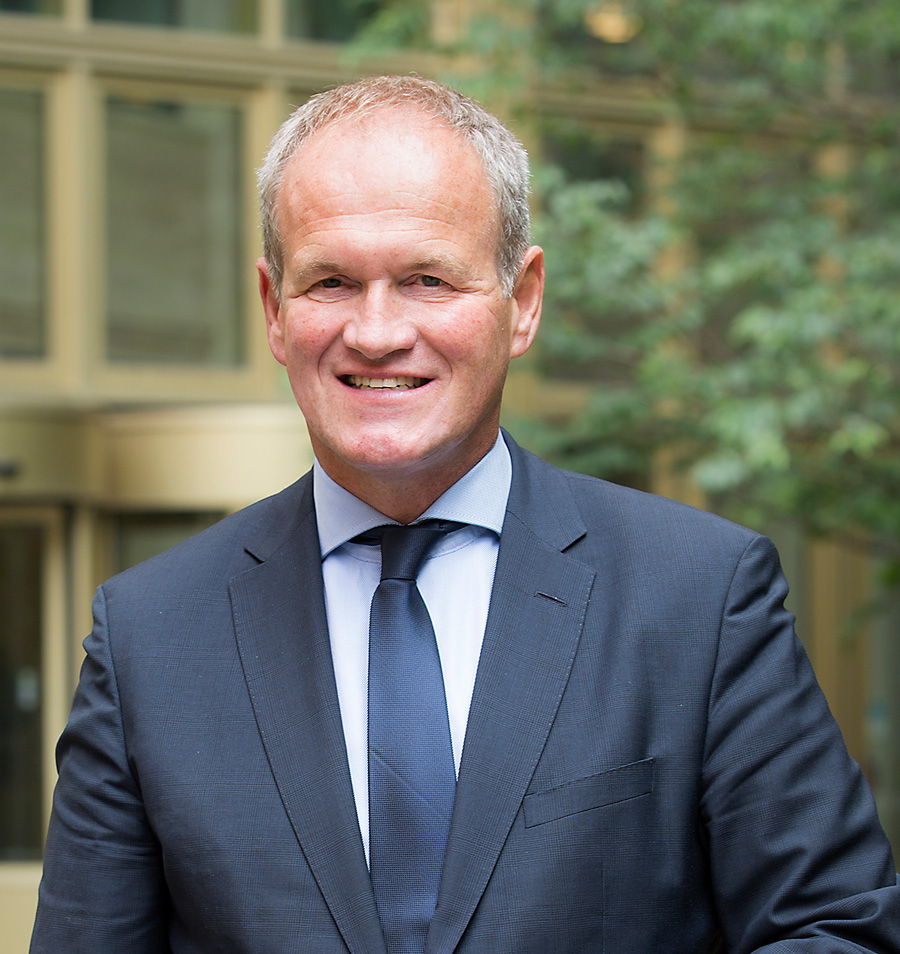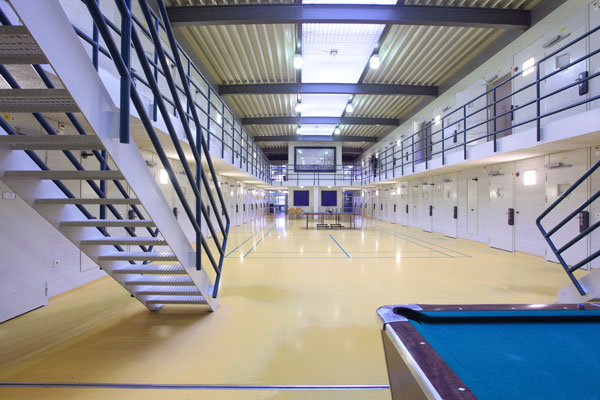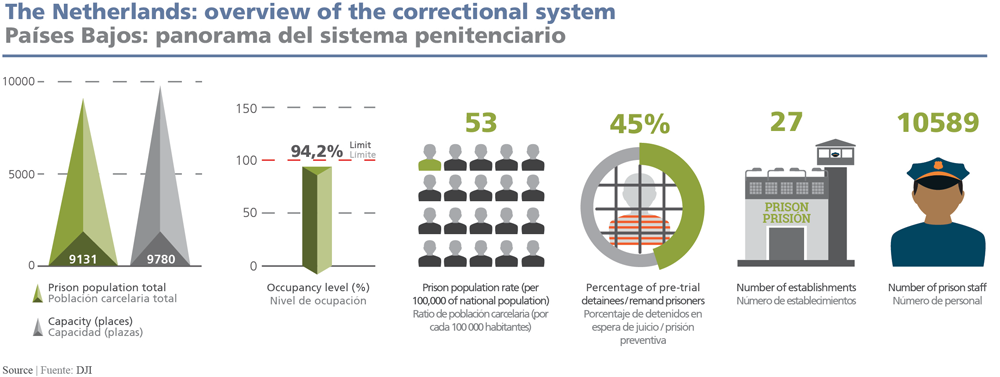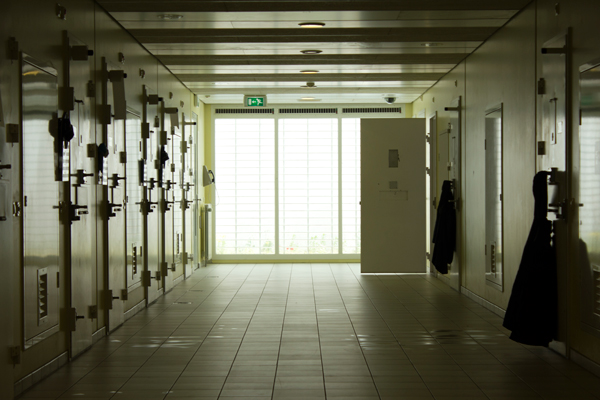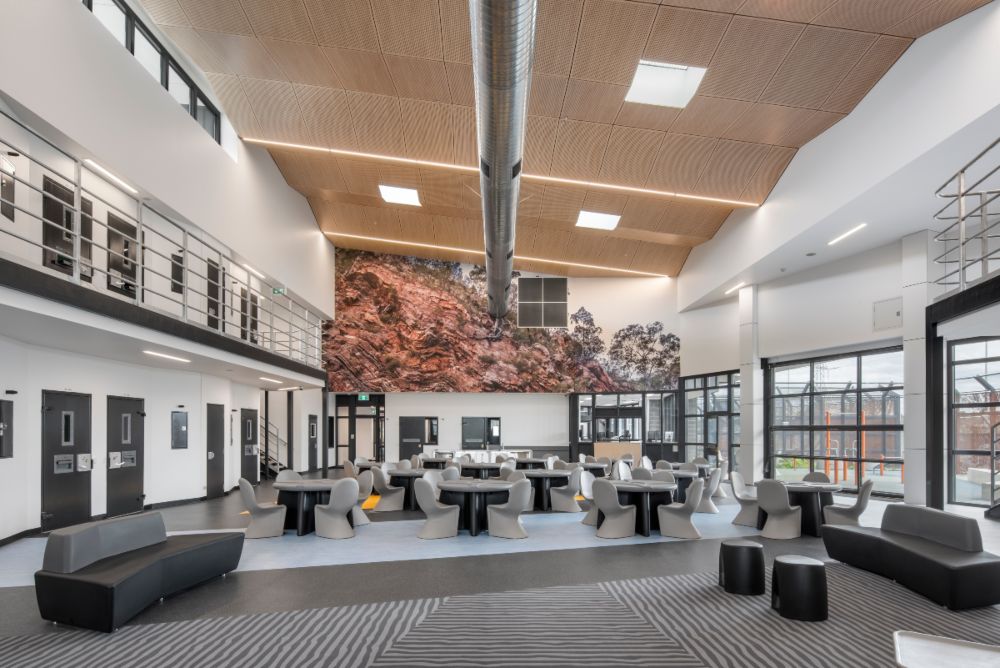// Interview: Gerard Bakker
Director-General of the National Agency of Correctional Institutions (DJI), The Netherlands
JT: What are the main principles and goals of the Agency of Correctional Institutions? And whether you have specific goals under your leadership?
GB: This is a very good question. The most important task is realising the detention of convicted individuals. Our biggest priority is to focus on successful reintegration of our inmates because that will reduce re-offending rates. Those are the main goals of our organisation.
We contribute to a safer society by implementing custodial measures and prison sentences, and by giving the people in our care the opportunity to build up a socially acceptable life. We are responsible for the day-to-day care of the detainees and their rehabilitation. Our re-offending rate is of about 47 percent.
Over the past few decades, this re-offending rate has slowly but surely dropped. We would like it to drop further in the future, that is why we keep trying to improve our prison system and our programmes. In my leadership I introduced three focus points for the next years.
The first one: Emancipation of implementation. Organisations that implement policy are getting a stronger voice in the process of policy making. We bring issues and solutions to the decision makers and I invite my staff to come with bottom-up ideas.
The ideas for the execution come on the table of the policymakers and the Minister. That is one of the main aspects I want to change. To execute what is coming to us but also to be active on goal-shooting, not just goalkeeping.
The second one: my organisation is a people’s organisation. We have over 13.000 people working for DJI, I am very proud of my staff. I have great faith in our expertise.
My employees must continue to develop and follow various education and training courses throughout their career. The challenges are big, and my staff members do not only have to be ready for today’s challenges but also for the challenges of tomorrow.
In the coming few years I will recruit 4000 new employees, and also educate them and prepare them for the job.
The third one: A prisoner belongs to society. We must look closely at the challenges of our work from the perspective of society. Nowadays we look at the challenges from the perspective of organisations. My approach is to be society-oriented: find the primary problems, solve them and share our realisations with everyone.
JT: Can you give us an idea of the Dutch correctional system, its main strengths and achievements?
GB: My belief is that a prisoner belongs to society. A prisoner is usually with us for a relatively short time, but he is part of society all his life. We as DJI can do one thing very well: confine individuals.
But in the long term, it would benefit society if those detainees were able to resume their lives after their imprisonment. We make society safer by doing that. My aim is to bring chain partners in our institutions from the very first day of detention. The challenge is too big for just one organisation, we need to work together. Cooperation is the key to success!
I work with the Municipality (the city) and the Probation Service. This year we have concluded an agreement with the probation service and the municipalities. Here we have understandings about working together for safe return to society, a person-oriented reintegration plan, and information exchange.
A safe return to society is in itself a goal, which is done through risk assessment throughout the detention period, with better screening in advance. Know your detainees: “What kind of person are we dealing with?” “Where is room for improvement?”
My personal motto is “I always want to be smarter in the evening than I started out in the morning”, and I ask the same of my staff.
Integral intake is another important aspect. We use five basic conditions – housing, income or work, care, insight into possible debt or addiction problems and a valid proof of identity – for a successful reintegration. It is important to have a balance on these 5 conditions.
People need a second chance. Economy in the Netherlands is doing quite well, and within this frame detainees can also be a solution instead of a problem for the society, since there are more jobs than available workforce at this moment. We do a lot in the field of work for detainees.
For each prisoner we make a tailor-made, customised plan, we anticipate what are the needs of the detainee to be able to function in society in the future. We do all to prevent recidivism, we want every detainee to leave our organisation with a plan, regardless of the duration of the sentence.
We do that in cooperation with our partners, the probation services and the municipality. Re-integration is too complex of a problem for just one organisation. We do it together and together we are stronger.
My belief is that a prisoner belongs to society. A prisoner is usually with us for a relatively short time, but he is part of society all his life. We as DJI can do one thing very well: detain detainees. But in the long term, it would benefit society if those detainees were able to resume their lives after their imprisonment. We make society safer by doing that.
JT: At a time when many countries in Europe are struggling with overcrowding in prisons, what factors are behind the excess of vacancies in Dutch correctional institutions and how has this reality been managed?
GB: From an historical perspective that was the case, but we have a new balance now. Several prisons have been closed and there is not excessive capacity anymore.
Our organisation has new challenges: we observed some major changes over the past decades regarding the people that get into prisons. We see more and more people with psychological and psychiatric problems, addictions, learning disabilities, etc. This requires a lot of effort from our staff and they must be helped to cope with it properly.
For this purpose, 100 million euros have been set aside for skills improvement and competence development, an extra annual budget of 25 million for the next four years.
JT: To what extent has the evolution of the degree of use of non-custodial alternative measures impacted on the emptying of Dutch prisons?
GB: For resocialisation reasons it is better sometimes that an offender keeps his job, stay with his family and do punishment in an alternative way. Community service serves a purpose. At other times imprisonment is more justified. It is an individual approach.
JT: Almost 25% of the prisoners in the Netherlands are foreigners. What does this imply in terms of management and performance of prison services and what challenges does it pose?
GB: In practice, co-detainees help if an employee and a detainee do not understand each other or if there is a communication problem. However, most detainees speak enough Dutch or English to be able to hold regular conversations.
We offer Dutch language courses to detainees that stay with us longer, but we do not offer trainings in their own native languages. Interpreters are used when necessary. Besides language difficulties there are also differences in culture. We also have a multi-cultural workforce, so that staff members may be able to assist.
Our staff is trained to deal with a diversity of people. Many of our documents are available in various languages. For example, an updated translation of our Rules of Procedure has become available to all prisoners in several languages.
For each prisoner we make a tailor-made, customised plan, we anticipate what are the needs of the detainee to be able to function in society in the future. We do all to prevent recidivism, we want every detainee to leave our organisation with a plan, regardless of the duration of the sentence.
JT: Less than 10% of the prison population is allocated to penal institutions under public-private partnerships. How have such partnerships worked for the correctional system so far and is it something you will pursue?
GB: Public-private partnerships are used more often in juvenile detention and forensic care and less in our prisons for adults. It is used, for example when cooperation is sought with employers to get detainees a job. However, for our adult prisoners we mainly use government institutions. With forensic care we purchase care and with juvenile detention we increasingly use small-scale facilities.
100 million euros have been set aside for skills improvement and competence development, an extra annual budget of 25 million for the next 4 years.
JT: Before you came to lead the country’s correctional system you had been the Director of the Central Reception Agency for Asylum Seekers (COA) of the Netherlands. How did you get to your current job and what do you draw from your previous work experience to lead the correctional agency?
GB: I have a PhD in criminology. The COA is more of a niche entity than the DJI. I brought all my experience at COA to the DJI. The DJI is a larger organisation with a different level of challenges. In my previous job, I already had contact with DJI because we work together in the reception and imprisonment of asylum seekers andforeing nationals involved with the Justice system.
I have worked before in fiscal investigation, for the prosecution, and in the competition authority. Now I work in the execution, another dimension of the chain of organisations that work for safety of society. I have worked on all the chain: investigation, prosecution and execution.
I try to look at different perspectives of what I face. When I was a child, my parents gave me a kaleidoscope. When you look through the glass you see an image that keeps changing.
My previous work experience has taught me the importance of looking through different ‘glasses/perspectives’, like economic, legal, and/or social points of view, in order to solve effectively. If you look at different perspectives, you face different results and get better solutions.
At my former position at the COA I learnt external orientation, which is for me an important basic skill. I asked to work inside of prisons because it is important to have an open mind, to look more at the society, more to the outside rather than the inside. Looking at it that way, we see how important it is to cooperate with other organisations.
//
Dr. Gerard Bakker (1959) started his social career as a Customs officer. After studying Tax and Penal Law at Leiden University and Amsterdam University, he became team leader at the Fiscal Intelligence and Investigation Service, followed by a managerial position at Customs. In 2008, he was appointed director of the Dutch Authority for Consumers and Markets (competition law). In 2014, Bakker obtained his PhD in Criminology at Ghent with a thesis on innovations in the enforcement chain, aimed at reducing financial and economic crime. From 2014 to 2018 he was chairman of the board of COA. In 2017, he was elected government manager of the year.

